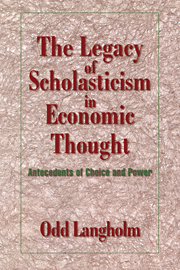Preface
Published online by Cambridge University Press: 13 March 2010
Summary
Historians of economic doctrine now recognize that modern theory is the product of continuous growth over a much longer period of time than was previously assumed. There is also, among historians in general, a renewed interest in the Middle Ages. The combination of these factors invites the question of what was the main and lasting contribution to economics of the medieval scholastics, that is, of the masters who taught and wrote in the first centuries of the European universities. The present volume contains the author's considered reply to that question. I first touched upon the subject some fifteen years ago in a brief article whose title, “Economic freedom in scholastic thought,” may still serve as a clue. “Economic freedom” has been used as a label on a number of quite different things. For the medieval scholastics, it derived its principal meaning from an issue that has lain at the core of Christian philosophy since its origin, that of the freedom of the human will. In scholastic economic thought, freedom in that sense was brought to bear on two of the elements of all market economies, namely, the phenomenon of need in the face of scarcity and the arrangement of need satisfaction by means of exchange. The question of freedom then became the question of the state of the will of a person who consents to certain terms of exchange because of need. Conversely, it became the question of compulsion by need or, in a personalized sense, of compulsion (or coercion) by one party to the exchange taking advantage of the other party's need.
- Type
- Chapter
- Information
- The Legacy of Scholasticism in Economic ThoughtAntecedents of Choice and Power, pp. vii - xPublisher: Cambridge University PressPrint publication year: 1998



